Left to right: Brenda Panama and Dr. Hasina Outtz Reed
Roles in Research
Exchange
A physician-scientist and a college student discuss how undergraduate research opportunities can boost the pipeline of future STEM professionals from historically underrepresented communities.
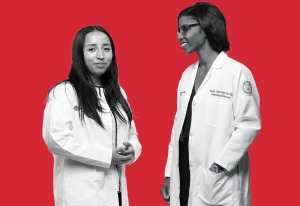
The role of early-stage scientists in research
Panama: My role in the lab involves replicating human chronic obstructive pulmonary disease (COPD) in preclinical models. I also shadow colleagues and try to stay current with the latest lymphatic research, so I can see the interplay between the lab’s research and my studies. I had never done bench work in a lab, and honestly, I never thought I’d have the opportunity to do this work as an undergraduate because it’s very competitive. It’s a privilege, and I’m grateful to Dr. Outtz Reed for this experience.
Dr. Outtz Reed: Brenda is downplaying her role in the lab a little bit. She actually has the main responsibility for our ongoing study on cigarette smoke and COPD, which lasts for over six months, and the level of organization necessary to keep all that straight for these very precious experiments is a lot. She has become an essential and trustworthy partner in the lab.
I had an undergraduate research experience, and that’s when I knew I wanted to be a bench scientist. I loved it. And that was the first time, like Brenda said, that I was trying to make those scientific connections and learn those techniques, so I think they’re really important in expanding the universe of what you can consider possible.
The importance of mentorship
Dr. Outtz Reed: The most important (and fun) job as a scientist is to try to create more scientists, and I think it’s important to train people in the lab technically. And those technical skills, ideally, can be translated into other research environments — even if the science isn’t the same. You should also learn other basics: how to think about and test a question, how to formulate a hypothesis. The other role of mentorship is to get students to think like and think of themselves as scientists, to embed themselves in the scientific community.
Good mentorship encourages everyone to have a voice no matter what their level of training is — because good science is just good science. I like to think that in my lab, everyone feels like they have a place at the table. Everyone should be able to think and speak freely about the science. The more opinions, the more thoughts there are on something, the better the science gets.
Why representation matters
Dr. Outtz Reed: It’s not lost on me as a woman of color that my presence alone is disruptive to the status quo. That’s a good thing. And I take that very, very seriously. If you’re underrepresented in any field, it’s helpful to see people who have similarities to you to make you feel that you have a place in that community. Diversity brings in diversity of thought and that makes the science better, which leads to better therapies, better treatment for diseases.
Panama: I’ve seen lack of representation in science firsthand in hospitals, when I’ve been in the emergency room and noticed many Latino patients, but few to no Latino doctors. This is extremely unfortunate and is something that could be addressed through mentorship. The lack of diversity definitely drives me to pursue a career in science.
Finding joy in the work
Dr. Outtz Reed: As a physician-scientist, I’m motivated by a natural curiosity of wanting to answer fundamental questions that further what we know about human disease to ultimately help people. It’s very difficult when you come into basic science and realize how often things fail — daily, all the time, things just don’t work. That’s just the way that basic science is — you have to keep going and enjoy that you are trying to answer a question that hasn’t been answered before. Because intrinsically, science can be very joyful. It’s a very cool thing to think for a living, to come up with the right question and answer it, to discover something that’s totally new. To be able to answer these questions that can lead people to better treatments for diseases just adds a really motivating element. Every day we’re trying to make the lives of patients better through the science that we do.
Panama: As a little girl, I never imagined having this opportunity in the lab as an undergraduate student. My parents came from Ecuador in search of a better life in the United States, and I feel fortunate to have been born here, with access to an endless number of opportunities. Most of my immediate family work in blue-collar jobs, so when I reflect on where I came from and what my life could have been, I feel immense joy seeing where I am now. Although my journey has just begun, I am excited to be a part of the scientific field. I love the fact that science is always changing. There’s always something getting discovered or debunked. Learning about innovations that are continuing to happen is what draws me to medicine and to science.
Fall 2024 Front to Back
-
From the Dean

Message from the Dean
By integrating innovations in artificial intelligence into clinical practice, the aim is to enhance, rather than replace, the personal care that patients value. -
Features
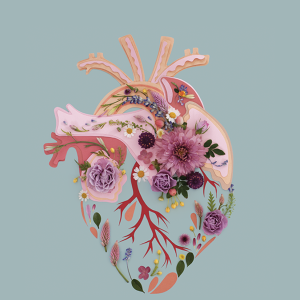
Change of Heart
To tackle long-standing sex disparities in outcomes for cardiac surgery, Weill Cornell Medicine physicians are pursuing innovative clinical trials and treatment -
Features

The Dark Side of STING
Painstaking research has yielded vital new insights on how a protein known for triggering inflammation can both hinder — and accelerate — cancer -
Features
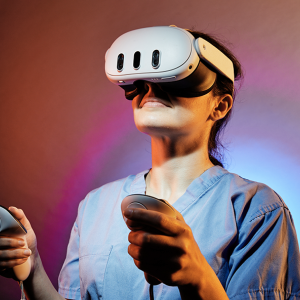
Teaching Empathy in the Digital Age
Meet C.A.R.L., a lifelike virtual “patient” who stands at the vanguard of advances in immersive learning that could improve the way doctors are trained. -
Notable

New Chair and Physician-in-Chief
Dr. Myles Wolf, who specializes in nephrology, will oversee Weill Cornell Medicine's largest clinical and academic department. -
Notable
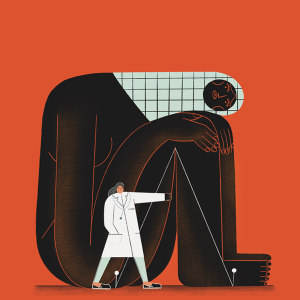
Dateline
Dr. Sasha Fahme is leading studies to better understand the sexual health challenges refugee women face. -
Notable

Overheard
Weill Cornell Medicine faculty members are leading the conversation about important health issues across the country and around the world. -
Notable

News Briefs
Notable faculty appointments, honors, awards and more — from around campus and beyond. -
Grand Rounds

Lending an Ear
How a single-sided cochlear implant is helping a psychiatry resident achieve his dreams. -
Grand Rounds

The Art of Medicine
Through visits to the Guggenheim and more, medical students are expanding their thinking to improve patient-centered care. -
Grand Rounds
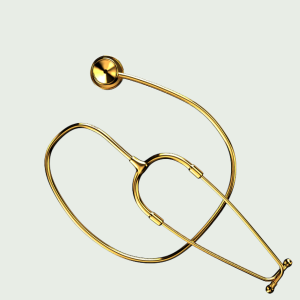
News Briefs
The latest on teaching, learning and patient-centered care. -
Discovery

Unraveling the Riddle of Suicide Risk
Researchers are identifying new preventive strategies by leveraging cutting-edge computational techniques and cross-disciplinary strategies. -
Discovery

A Common Type of Fiber May Trigger Bowel Inflammation
An unexpected finding could pave the way for therapeutic diets that ease symptoms and promote gut health. -
Discovery
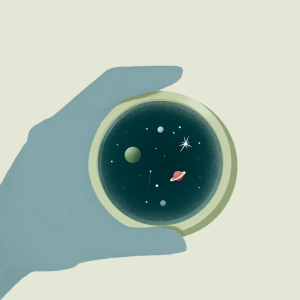
Findings
The latest advances in faculty research, published in the world’s leading journals. -
Alumni

Profiles
From leading the Alumni Association to improving public communication of science, our alumni are making an impact. -
Alumni

Notes
What’s new with you?
Keep your classmates up to date on all your latest achievements with an Alumni Note. -
Alumni

In Memoriam
Marking the passing of our faculty and alumni.
-
Alumni
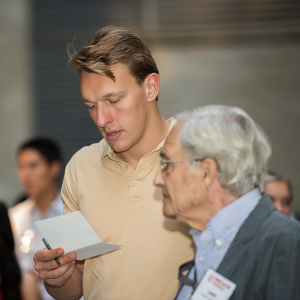
Moments
Marking celebratory events in the lives of our students and alumni, including the White Coat Ceremony and Reunion. -
Second Opinion

Taming Weed
How can medicine and public health address largely unregulated, readily available and potentially harmful marijuana products? -
Exchange
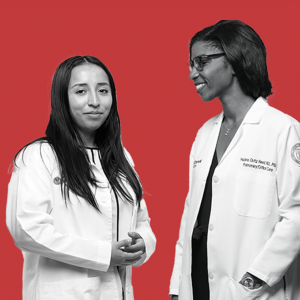
Roles in Research
A physician-scientist and a college student discuss how undergraduate research opportunities can boost the STEM pipeline of those from historically underrepresented communities. -
Muse
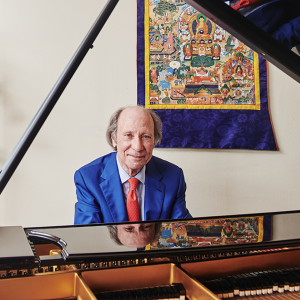
Making the Music
Clinical psychologist Dr. Robert Allan finds inspiration from composing and playing the piano. -
Spotlight
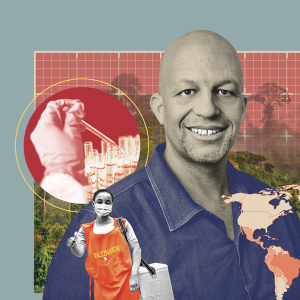
Therapeutic Advocate
In his quest to help more patients, Dr. Joseph Amprey (M.D. ‘04, Ph.D. ‘02) shifted from clinical practice to drug development.